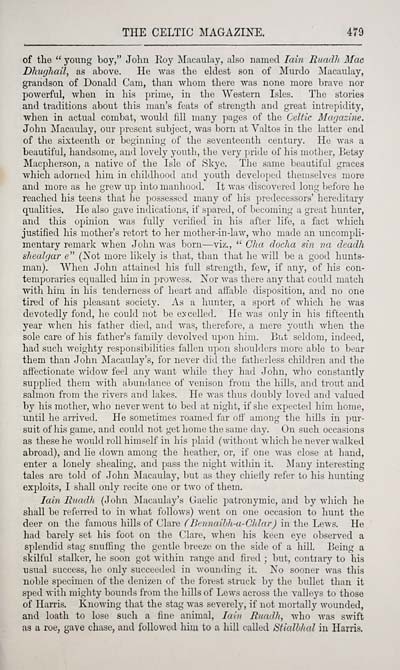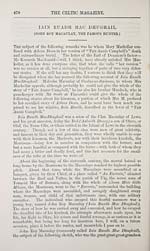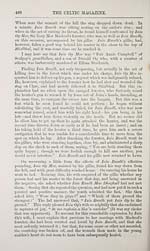Blair Collection > Celtic magazine > Volume 2
(489)
Download files
Complete book:
Individual page:
Thumbnail gallery: Grid view | List view

THE CELTIC MAGAZINE. 479
of tlie " young boy," Joliu Roy Macaulay, also named Iain Ruadh Mac
DhuglmU, as .above. He was the eldest son of Muvdo ^lacaulay,
grandson of Donald Cam, than whom there was none more brave nor
powerful, when in his jirime, in the Western Isles. The stories
and traditions about this man's feats of strength and great intrepidity,
when in actual combat, would fill many pages of the Celtic Magazine.
John Macaulay, our jjresent subject, was born at Valtos in the latter end
of the sixteenth or beginning of the seventeenth century. He was a
beautiful, handsome, and lovely youth, the very pride of his mother, Betsy
Macpherson, a native of the Isle of 8kye. The same beautiful graces
Avhich adorned him in childhood and youth developed themselves more
and more as he grew up into manhood. It was discovered long before he
reached his teens that he possessed many of his predecessors' hereditary
qualities. He also gave indications, if spared, of becoming a great hunter,
and this opmion was fully verified in his after life, a fact which
justified his mother's retort to her mother-in-law, who made an uncompli-
mentary remark when John was born — viz., " Gha doclia sin na deadli
sitealgar e" (Xot more likely is that, than that he will be a good hunts-
man). When John attained his full strength, few, if any, of his con-
temporaries equalled him in prowess. Nor was there any that could match
with him in his tenderness of heart and affable disposition, and no one
tired of his pleasant society. As a hunter, a sport of which he was
devotedly fond, he could not be excelled. He was only in his fifteenth
year when his father died, and was, therefore, a mere youth when the
sole care of his father's family devolved upon him. But seldom, indeed,
had such weighty responsibilities fallen upon shoulders more able to bear
them than John Macaulay's, for never did the fatherless children and the
aft'ectionate widow feel any want while they had John, Avho constantly
supplied them Avith abundance of venison from the hills, and trout and
salmo7i from the rivers and lakes. He Avas thus doubly loved and A'alued
by his mother, Avho never Avent to bed at night, if she expected him home,
until he arrived. He sometimes roamed far off' among the hills in j)ur-
suit of his game, and could not get home the same day. On such occasions
as these he Avould roll himseK in his plaid (without Avhich he never Avalked
abroad), and lie down among the heather, or, if one Avas close at hand,
enter a lonely shealing, and pass the night Avithin it. Many interesting
tales are told of John Macaulay, but as they chiefly refer to his hunting
exploits, I shall only recite one or two of them.
Iain Ruadh (Jolm ]\Iacaulay's Gaelic patronymic, and by which he
shall be referred to in Avhat follows) Avcnt on one occasion to hunt the
deer on the famous hills of Clare ( Bennaihh-a-Cldar ) in the Lcavs. He
had barely set his foot on the Clare, when his keen eye observed a
splendid stag snuffing the gentle breeze on the side of a hiU. Being a
skilful stalker, he soon got Avithin range and fij-ed ; but, contrary to his
usual success, he only succeeded in Avounding it. No sooner was this
noble specimen of the denizen of the forest struck by the bullet than it
sped Avith mighty bounds from the hills of Lews across the valleys to those
of Harris. KnoAving that the stag Avas severely, if not mortally Avounded,
and loath to lose such a fine animal, Iain Ruadh, who Avas SA^dft
as a roe, gave chase, and foUoAved him to a hill called Stialbhal in Harris.
of tlie " young boy," Joliu Roy Macaulay, also named Iain Ruadh Mac
DhuglmU, as .above. He was the eldest son of Muvdo ^lacaulay,
grandson of Donald Cam, than whom there was none more brave nor
powerful, when in his jirime, in the Western Isles. The stories
and traditions about this man's feats of strength and great intrepidity,
when in actual combat, would fill many pages of the Celtic Magazine.
John Macaulay, our jjresent subject, was born at Valtos in the latter end
of the sixteenth or beginning of the seventeenth century. He was a
beautiful, handsome, and lovely youth, the very pride of his mother, Betsy
Macpherson, a native of the Isle of 8kye. The same beautiful graces
Avhich adorned him in childhood and youth developed themselves more
and more as he grew up into manhood. It was discovered long before he
reached his teens that he possessed many of his predecessors' hereditary
qualities. He also gave indications, if spared, of becoming a great hunter,
and this opmion was fully verified in his after life, a fact which
justified his mother's retort to her mother-in-law, who made an uncompli-
mentary remark when John was born — viz., " Gha doclia sin na deadli
sitealgar e" (Xot more likely is that, than that he will be a good hunts-
man). When John attained his full strength, few, if any, of his con-
temporaries equalled him in prowess. Nor was there any that could match
with him in his tenderness of heart and affable disposition, and no one
tired of his pleasant society. As a hunter, a sport of which he was
devotedly fond, he could not be excelled. He was only in his fifteenth
year when his father died, and was, therefore, a mere youth when the
sole care of his father's family devolved upon him. But seldom, indeed,
had such weighty responsibilities fallen upon shoulders more able to bear
them than John Macaulay's, for never did the fatherless children and the
aft'ectionate widow feel any want while they had John, Avho constantly
supplied them Avith abundance of venison from the hills, and trout and
salmo7i from the rivers and lakes. He Avas thus doubly loved and A'alued
by his mother, Avho never Avent to bed at night, if she expected him home,
until he arrived. He sometimes roamed far off' among the hills in j)ur-
suit of his game, and could not get home the same day. On such occasions
as these he Avould roll himseK in his plaid (without Avhich he never Avalked
abroad), and lie down among the heather, or, if one Avas close at hand,
enter a lonely shealing, and pass the night Avithin it. Many interesting
tales are told of John Macaulay, but as they chiefly refer to his hunting
exploits, I shall only recite one or two of them.
Iain Ruadh (Jolm ]\Iacaulay's Gaelic patronymic, and by which he
shall be referred to in Avhat follows) Avcnt on one occasion to hunt the
deer on the famous hills of Clare ( Bennaihh-a-Cldar ) in the Lcavs. He
had barely set his foot on the Clare, when his keen eye observed a
splendid stag snuffing the gentle breeze on the side of a hiU. Being a
skilful stalker, he soon got Avithin range and fij-ed ; but, contrary to his
usual success, he only succeeded in Avounding it. No sooner was this
noble specimen of the denizen of the forest struck by the bullet than it
sped Avith mighty bounds from the hills of Lews across the valleys to those
of Harris. KnoAving that the stag Avas severely, if not mortally Avounded,
and loath to lose such a fine animal, Iain Ruadh, who Avas SA^dft
as a roe, gave chase, and foUoAved him to a hill called Stialbhal in Harris.
Set display mode to: Large image | Transcription
Images and transcriptions on this page, including medium image downloads, may be used under the Creative Commons Attribution 4.0 International Licence unless otherwise stated. ![]()
| Early Gaelic Book Collections > Blair Collection > Celtic magazine > Volume 2 > (489) |
|---|
| Permanent URL | https://digital.nls.uk/78486022 |
|---|
| Description | Volume II, 1877. |
|---|---|
| Shelfmark | Blair.3 |
| Attribution and copyright: |
|
| Description | A selection of books from a collection of more than 500 titles, mostly on religious and literary topics. Also includes some material dealing with other Celtic languages and societies. Collection created towards the end of the 19th century by Lady Evelyn Stewart Murray. |
|---|
| Description | Selected items from five 'Special and Named Printed Collections'. Includes books in Gaelic and other Celtic languages, works about the Gaels, their languages, literature, culture and history. |
|---|

